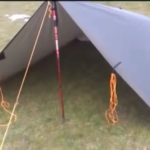Bugging-in is one of the best survival scenarios to hope for, as long as you are prepared. One of the fundamental elements of a solid bugging-in system is to have lots of food on hand that is nutritious and enjoyable. You want to focus on foods that are easy to prepare, store and consume when needed. However, you should make sure that you use food and ingredients that you already eat and enjoy as a large percentage of your emergency supply.
You want to concentrate on dry and canned goods to represent the largest part of your stockpile. These items are usually pre-cooked or only require water to prepare. They are easy to store and can last a long time if they are packaged properly. You want to avoid relying on refrigerated or frozen items. If the power goes out, then everything in the fridge and freezer can be spoiled. Also, lot of items in a fridge tend to have a short shelf-life, so they won’t last more than a week or two unless they have been frozen.
Developing a Practical Menu
As mentioned before, you want to choose items that you and your family enjoy. Having food that you like on hand will provide a huge morale boost during a time of great stress and worry. It will also promote eating more than digging into a can of stuff that you hate. You will need to eat in order to maintain health, energy and clarity of thought. So, make a list of things that you cook and eat now, and decide on items that can be prepared in advance, canned and served in the future.
Of course, this doesn’t mean that you can make a lot of complicated items, or dishes that require lots of bread, cheese and other things that are not easy to store. However, things like soups, sauces, chili, stews, pastas and a host of similar foods can be canned and consumed months later. You also want to pack and store nutritious items such as your favorite fruits and vegetables. You can can almost any kind while also preserving their nutritional integrity.
Dry goods such as rice, beans, pastas and flour will keep for a very long time if they are packaged properly as well. However, it is important to use these items as part of a balanced diet that also includes protein and nutrients. Carbohydrates are good for energy, but you can not survive on carbs alone. So, think about what kind of things you like, make a list, and then determine which can be stored in cans.
Proper Packaging is Critical
No food is safe from parasites, bacteria or spoilage if it is not packaged properly. If you are purchasing canned goods such as soups, veggies or meats, make sure that the cans are in good condition and that they are consumed by the expiration date. If you get rice, flour, sugar, salt, pastas or other dry goods, make sure that you put them in an airtight container or one that is vacuum packed. Freeze dried goods overnight after they have been packed in order to kill off microorganisms. You will probably have to boil organic foods for a specified amount of time in order to kill off bacteria.
Consider getting a canning or food storage booklet so you can become better acquainted with what steps are necessary to safely preserve food. Foods that are properly treated and packaged can keep for months or even years, so this is one option that every prepper who wants to be ready to bug-in can benefit from doing. Make sure that you only store foods that are properly packaged to avoid spoilage and ensure a safe food supply.
Canning is a great option to consider because you can cook a range of meals in bulk, store loads of fruits and veggies, and create meals that require minimal preparation once they are used. There are good canning products on the market today that are very affordable and easy to use. Learning how to can is not difficult, and you can begin to immediately enhance your emergency food supply while also having some delicious foods on hand as well.
Rotate Everything
You want to make sure that you label and date every food item that is going into the pantry or storage. Put the older items as well as items with a short-shelf life in front so you can consume them first. You want to get used to this practice for a couple of reasons. First, rotating ensures that you are minimizing waste by not allowing items to spoil. Second, you will be consuming foods that you are storing now instead of keeping them put away for the potential catastrophe.
You want to make foods that you eat now so you will eat them through the normal course of living in your home. This will help you to get in the habit of eating prepared foods while getting proficient at the nuances of canning. It will help you to get a sense of portion sizes and how much food you and your family will consume during the course of an average meal. It will help you to determine what foods people like and what they will not eat. These and other benefits will help you to create a food stockpile that will be perfectly customized around your needs.
Diversity Matters
One of the biggest challenges that anyone will face in a serious or SHTF situation is maintaining an optimal level of nutrition. You need to have healthy foods on hand in order to keep your body nourished when you are going through stressful times. Fruits act as cleansers to the body and boost the immune system. They also provide energy. Vegetables make increase alkalinity in the blood, which is essential to promoting cell health and re-generation. The minerals in vegetables are essential for everything from regulating organ function to ensuring that cells and blood are doing their jobs.
So, make sure that your food stockpile doesn’t just have boxes of cookies, pasta and snacks. You should have an ample supply of goodies on hand, but you really want to make sure that the vast majority of items in your shelter or pantry are vegetable-based and include fruit. Canning meats is also very easy, and you can make a range of meals that you eat everyday. Consider these things as you plan your meals and storage system. Promote nutrition, make things taste good and have a good range of snacks on hand. Just because you are hunkering down in your home doesn’t mean that you need to suffer from a lack of good food.
Each week that you go shopping, set aside a few dollars for buying food for storage. Set aside some time on a regular basis to prepare these items and add them to your system. You don’t need to wait until you have everything all at once, and starting small will ensure that you have at least something ready if a disaster strikes tomorrow. You will be amazed with how quickly things add up, and before you know it, your pantry or bunker will be loaded with delicious items that are ready for immediate consumption.
Consider getting items in bulk instead of smaller portions as well. It will be a lot cheaper and easier to store a large bag of dried goods instead of going out and getting regular boxes from the grocery store. Consider making meals in bulk as well. Canning gives you the luxury to make a huge stew or soup and store. This will also reduce the amount of prep-time that you need if you decide to make smaller portions on-demand during the course of normal eating. It will also help you to rotate and consume foods that you’ve already prepared as well.
These are just a few suggestions that can help you to start your customized food storage system. Remember, that there is no perfect solution to every need. You and your family have their own unique preferences and dietary requirements. Sit down, start to write down lists and ideas and develop a good long-term meal storage plan.
You will be surprised with how much you can accomplish, and you will be closer to being prepared for bugging-in a lot sooner than you think. Don’t fall into the trap of simply stocking up on tuna fish, spam, crackers and beans. Explore your options and create foods that will really go the distance during a crisis. Remember to shop now and start preparing while supplies are available as well. If you wait until there is an emergency, chances are that there will be a frenzy at the store that is best avoided if at all possible. Start thinking about your bugging-in food storage system, and get into the habit of incorporating it into your normal way of life now. The transition will be easier, your food supply will be more enjoyable, and you will be better prepared to meet the various challenges that lie ahead without worrying about your next meal.



















